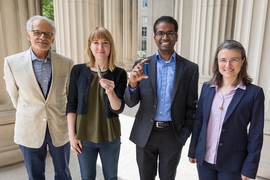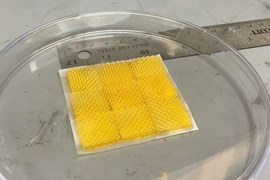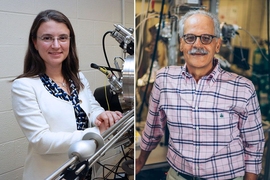The MIT Energy Initiative (MITEI) recently awarded seven grants totaling approximately $1 million through its Seed Fund Program, which supports early-stage innovative energy research at MIT through an annual competitive process.
“Supporting basic research has always been a core component of MITEI’s mission to transform and decarbonize global energy systems,” says MITEI Director Robert C. Armstrong, the Chevron Professor of Chemical Engineering. “This year’s funded projects highlight just a few examples of the many ways that people working across the energy field are researching vital topics to create a better world.”
The newly awarded projects will address topics such as developing efficient strategies for recycling plastics, improving the stability of high-energy metal-halogen flow batteries, and increasing the potential efficiency of silicon solar cells to accelerate the adoption of photovoltaics. Awardees include established energy faculty members and others who are new to the energy field, from disciplines including applied economics, chemical engineering, biology, and other areas.
Demand-response policies and incentives for energy efficiency adoption
Most of today’s energy growth is occurring in developing countries. Assistant Professor Namrata Kala and Professor Christopher Knittel, both of whom focus on applied economics at the MIT Sloan School of Management, will use their grant to examine key policy levers for meeting electricity demand and renewable energy growth without jeopardizing system reliability in the developing world.
Kala and Knittel plan to design and run a randomized control trial in New Delhi, India, in collaboration with a large Indian power company. “We will estimate the willingness of firms to enroll in services that reduce peak consumption, and also promote energy efficiency,” says Kala, the W. Maurice Young (1961) Career Development Professor of Management. “Estimating the costs and benefits of such services, and their allocation across customers and electricity providers, can inform policies that promote energy efficiency in a cost-effective manner.”
Efficient conversion of methane to methanol
Methane, the primary component of natural gas, has become an increasingly important part of the global energy portfolio. However, the chemical inertness of methane and the lack of efficient methods to convert this gaseous carbon feedstock into liquid fuels has significantly limited its application. Yang Shao-Horn, the W.M. Keck Professor of Energy in the departments of Mechanical Engineering and Materials Science and Engineering, seeks to address this problem using her seed fund grant. Shao-Horn and Shuai Yuan, a postdoc in the Research Laboratory of Electronics, will focus on achieving efficient, cost-effective gas-to-liquid conversion using metal-organic frameworks (MOFs) as electrocatalysts.
Current methane activation and conversion processes are usually accomplished by costly and energy-intensive steam reforming at elevated temperature and high pressure. Shao-Horn and Yuan’s goal is to design efficient MOF-based electrocatalysts that will permit the methane-to-methanol conversion process to proceed at ambient temperature and pressure.
“If successful, this electrochemical gas-to-liquid concept could lead to a modular, efficient, and cost-effective solution that can be deployed in both large-scale industrial plants and remotely located oil fields to increase the utility of geographically isolated gas reserves,” says Shao-Horn.
Using machine learning to solve the “zeolite conundrum”
The energy field is replete with opportunities for machine learning to expedite progress toward a variety of innovative energy solutions. Rafael Gómez-Bombarelli, the Toyota Assistant Professor in Materials Processing in the Department of Materials Science and Engineering, received a grant for a project that will combine machine learning and simulation to accelerate the discovery cycle of zeolites.
Zeolites are materials with wide-ranging industrial applications as catalysts and molecular sieves because of their high stability and selective nanopores that can confine small molecules. Despite decades of abundant research, only 248 zeolite frameworks have been realized out of the millions of possible structures that have been proposed using computers — the so-called zeolite conundrum.
The problem, notes Gómez-Bombarelli, is that discovery of these new frameworks has relied mostly on trial-and-error in the lab — an approach that is both slow and labor-intensive.
In his seed grant work, Gómez-Bombarelli and his team will be using theory to speed up that process. “Using machine learning and first-principles simulations, we’ll design small molecules to dock on specific pores and direct the formation of targeted structures,” says Gómez-Bombarelli. “This computational approach will drive new synthetic outcomes in zeolites faster.”
Effective recycling of plastics
Professor Anthony Sinskey of the Department of Biology, Professor Gregory Stephanopoulos of the Department of Chemical Engineering, and graduate student Linda Zhong of biology have joined forces to address the environmental and economic problems posed by polyethylene terephthalate (PET). One of the most synthesized plastics, PET exhibits an extremely low degradation rate and its production is highly dependent on petroleum feedstocks.
“Due to the huge negative impacts of PET products, efficient recycling strategies need to be designed to decrease economic loss and adverse environmental impacts associated with single-use practices,” says Sinskey.
“PET is essentially an organic polymer of terephthalic acid and ethylene glycol, both of which can be metabolized by bacteria as energy and nutrients. These capacities exist in nature, though not together,” says Zhong. “Our goal is to engineer these metabolic pathways into E. coli to allow the bacterium to grow on PET. Using genetic engineering, we will introduce the PET-degrading enzymes into E. coli and ultimately transfer them into bioremediation organisms.”
The long-term goal of the project is to prototype a bioprocess for closed-loop PET recycling, which will decrease the volume of discarded PET products as well as the consumption of petroleum and energy for PET synthesis.
The researchers’ primary motivation in pursuing this project echoes MITEI’s overarching goal for the seed fund program: to push the boundaries of research and innovation to solve global energy and climate challenges. Zhong says, “We see a dire need for this research because our world is inundated in plastic trash. We’re only attempting to solve a tiny piece of the global problem, but we must try when much of what we hold dear depends on it.”
The MITEI Seed Fund Program has awarded new grants each year since it was established in 2008. Funding for the grants comes chiefly from MITEI’s founding and sustaining members, supplemented by gifts from generous donors. To date, MITEI has supported 177 projects with grants totaling approximately $23.6 million.
Recipients of MITEI Seed Fund grants for 2019 are:
- "Development and prototyping of stable, safe, metal‐halogen flow batteries with high energy and power densities" — Martin Bazant of the departments of Chemical Engineering and Mathematics and T. Alan Hatton of the Department of Chemical Engineering;
- "Silicon solar cells sensitized by exciton fission" — Marc Baldo of the Department of Electrical Engineering and Computer Science;
- "Automatic design of structure‐directing agents for novel realizable zeolites" — Rafael Gómez‐Bombarelli of the Department of Materials Science and Engineering;
- "Demand response, energy efficiency, and firm decisions" — Namrata Kala and Christopher Knittel of the Sloan School of Management;
- "Direct conversion of methane to methanol by MOF‐based electrocatalysts" — Yang Shao‐Horn of the departments of Mechanical Engineering and Materials Science and Engineering;
- "Biodegradation of plastics for efficient recycling and bioremediation" — Anthony Sinskey of the Department of Biology and Gregory Stephanopoulos of the Department of Chemical Engineering; and
- "Asymmetric chemical doping for photocatalytic CO2 reduction" — Michael Strano of the Department of Chemical Engineering.









